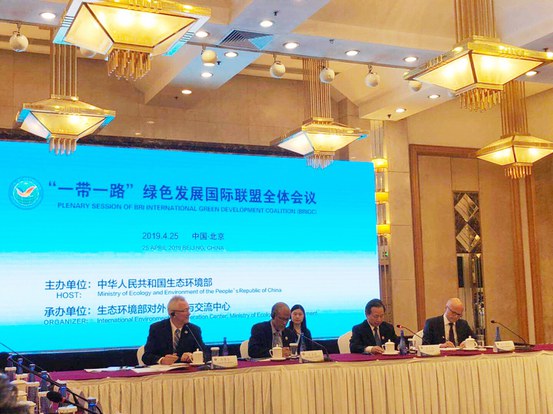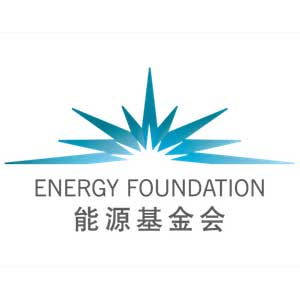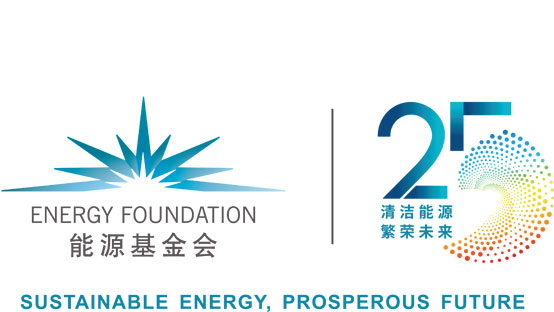Green Development Crucial for BRI’s Success, Says Zou Ji
The BRI International Green Development Coalition held its very first plenary session in Beijing in the morning of April 25, on the sidelines of the Chinese government’s second Belt and Road Forum. The session hosted representatives from governments, international organizations, research institutes, and enterprises, such as Li Ganjie, Minister of Ecology and Environment of China; Masagos Zulkifli, Minister for the Environment and Water Resources of Singapore; Jorge Chediek, Envoy of the United Nations Secretary-General on South-South Cooperation and Director of the United Nations Office for South-South Cooperation; and Liu Zhenya, Chairman of the Global Energy Interconnection Development and Cooperation Organization. Zou Ji, President of Energy Foundation China, also attended and addressed the plenary session.

(Photo by Zou Ji)
Chinese President Xi Jinping proposed to establish the BRI International Green Development Coalition at the first Belt and Road Forum for International Cooperation back in May 2017. The coalition is designed to plant green DNA into the Belt and Road Initiative, build up international consensus, and facilitate countries along the belt and road implementing the 2030 Agenda for Sustainable Development of the United Nations.
Zhao Yingmin, Commissioner of the Advisory Committee of the coalition and Vice Minister of Ecology and Environment of China, introduced the basic facts and key tasks of the coalition. Members and experts present at the event voiced their opinions on its work.
According to Zou Ji, the coalition should, first of all, reach the consensus that “green and low-carbon” development is one of the most important criteria for judging whether the BRI is successful. The goals of the initiative should be compatible with those of the U.N. Sustainable Development Goals (SDGs) and the Paris Agreement.
As a torchbearer for the SDGs and the Paris Agreement, as well as the country proposed the BRI, China has scored impressive achievements in green and low-carbon development. For example, China has featured “ecological civilization” and green development in national strategies; brought forward ambitious visions, goals, plans and policies; been able to mobilize resources and provide intuitive experiences and lessons; enjoyed strengths in technological innovation and application, financing for infrastructure, and other areas; and served as an emerging provider of public goods for global development in international environmental governance, Zou said.

(Left: Zou Ji, President of Energy Foundation China. Photo by Huang Su)
Zou also came up the following suggestions for the work of the coalition:
Firstly, the coalition can engage in policy dialogue, joint research, capacity building, and other activities in such areas as strategic planning, roadmap design, and major issues deep-dive for international cooperation in the SDGs, Paris Agreement, Kigali Amendment to the Montreal Protocol, and other multilateral environmental agreements. Among others, the priorities shall rest with cooperation in standards, guide rules, plans, roadmaps, financing, economic tools, innovation, and policy implementation.
Secondly, it is important for the coalition to help achieve the synergy of growth, energy, environment, and climatic goals. In the near future, it may focus on the co-control of local air pollutants and greenhouse gases, as well as applicable areas based on natural solutions.
Thirdly, the coalition shall tap into the drivers for green and low-carbon development, such as renewable energy, smart power grid, clean and efficient production, low-carbon transportation, optimization of land use and spatial structure, and innovation across industries.
Fourthly, it is suggested to advance the extensive participation of international and national stakeholders, and to launch inter-governmental and non-governmental communication and cooperation.
Zou noted that Energy Foundation China would remain proactive in supporting the work of the coalition. For now, the foundation has started clean power, cooling efficiency, low-carbon cities, green transportation, and green financing cooperation in the Asian-Pacific region, especially the Southeast Asia. It looks forward to contributing more to the coalition, said him.



